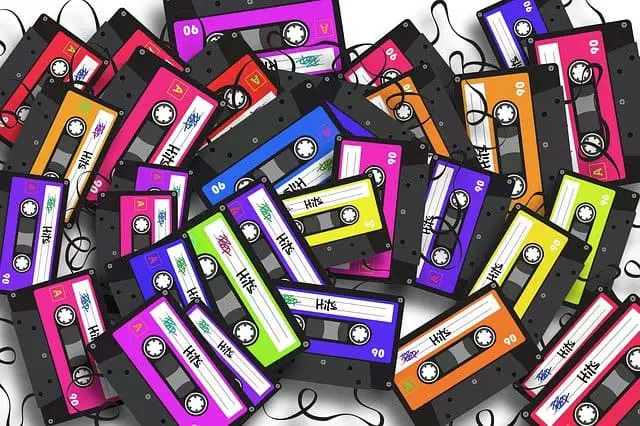Imagine a time when your choice of music consumption didn’t involve anything Internet related, MP3s weren’t invented and wireless tech hadn’t been rolled out yet. Get rid of all streaming options, YouTube, and all other Internet-based technologies since they didn’t yet exist.
All you were left with were vinyl records and audio cassette tapes or cassettes as they were simply known as. Cassettes were played on a cassette deck which came in several different forms which we’ll discuss below.
But if you’re still in the possession of old audio cassettes and want to dispose of them you might wonder if you can recycle them or otherwise get rid of them in an environmentally friendly way?
Audio cassette tapes can be recycled at specialty recycling centers. While some of the plastic and paper cassette protectors can be recycled, the actual tape from the cassettes isn’t generally recyclable in local facilities as it has chemicals on it to provide its audio properties.
What are audio cassette tapes made of?
The outside of the cassette is plastic that is typically black in color. While some artists produced cassettes of various colors black was the standard although clear cassettes became popular as well. The plastic of the cassette may be recyclable in your local area minus the tape however.
The tape of the cassette is made from a magnetic plastic film typically with iron oxide or chromium oxide. It’s generally not recyclable and while it often ends up in a landfill as a result, should really not be thrown out unless other options are exhausted as we’ll discuss below.
What other parts of audio cassette tapes are recyclable?
If you have some old cassettes lying around and you’re never going to listen to them again, my first thought would be to try to sell them to someone else so they can use them. Pick your favorite online selling site and see what you can get for them and maybe make a bit of cash on the side. That way there’s nothing to recycle as someone else can make use of them.
You might find a local record store or other business specializing in retro items that would be willing to take them off your hands.
You could also donate them if you can find an organization who may accept them. Thrift stores and local charitable boxes might be able to make use of them.
Short of that, any paper protective case that you have from old cassette singles or clear plastic protective boxes from album cassettes can be recycled depending on your local area.
Plus there are companies like Green Citizen and Red Propeller in Canada that recycle both audio and VHS cassette tape for a small fee.
How you do you play and operate cassette tapes?
Cassette tapes require a cassette player of some sort to play them. Back in the day, cassette decks (as they were called) were typically offered in the following formats:
- Standalone cassette players that did nothing but play and possibly record cassettes.
- As part of a stereo system that would usually be put in your living room or basement and also included a radio tuner and possibly a record player.
- As part of a Ghetto blaster i.e. a large portable cassette decks that usually also had AM/FM radio functionality.
- In a Walkman or other portable device that you could take on the go while jogging, walking or were otherwise away from home.
- In your car as part of its audio system.
Why did audio cassette tapes disappear from the market?
In short, audio cassettes were replaced by superior technology namely the Compact Disc (CD). Once you got past the portability of cassettes, there really wasn’t a benefit to be had that the CD didn’t improve upon.
Vinyl records are largely regarded as offering superior sound quality to cassettes so they were beat there too.
By the time CDs began to get established, the downsides of cassette tapes were even more glaring:
- Pedestrian sound quality that waned as the cassette was used.
- The annoying and time-consuming aspect of rewinding and fast forwarding to get to your favorite songs on an album.
- Cassette tapes getting stuck in the cassette player often ripping them or damaging them to the point of losing parts of songs or ruining them completely.
What benefits did audio cassette tapes offer music listeners?
The main benefits of cassette tapes was their portability, small size and durability certainly when compared to vinyl records which could easily break if dropped on the ground.
Mix tapes became a phenomenon where you could record cassettes filled with your favorite songs to take with you on a road trip in your car or for your Walkman or other listening device.
Another common use for cassettes didn’t even involve music: You could record your voice on cassette and send someone an audio recording in lieu of mailing them a latter.
Beyond that though, audio cassettes didn’t really offer much more in terms of benefits especially as newer technologies were released.
How good is the music quality on cassette tapes?
It’s generally accepted that vinyl and Compact Discs offer better music quality than cassette tapes which is a major reason why cassettes died out decades ago as a common music format.
While commercially produced albums were good to listen to, the more you listened to the cassette the more the sound would be degraded over time as the tape wore out.
If you tried to tape record voice recordings or other sounds, you often noticed a hissing sound that was very noticeable. The background noise from taping sound with a cassette was very obvious to even the untrained ear.
Higher end cassette decks often came with a noise reduction button to lower the hissing but that often changed the resulting sound too. Quality cassette players had a Signal-to-noise (SNR) feature that could reduce the background noise and hissing better than other players could too.
Will audio cassette tapes every make a comeback?
Nostalgia can be a powerful thing. Audio cassette tapes are making a comeback of sorts along with LPs and the continued popularity of CDs. While much smaller in market share than the other two formats, audio cassette sales recently saw growth of 33% year over year.
Other than nostalgia, there’s another reason why cassettes – and vinyl and CDs – are growing in popularity: An entire generation of people have never consumed a physical form of music before. For those of us who grew up before the 2000s, our music had a physical component, always.
A record. CD. Cassette tape. 8-track (!) tape. Something we could touch and hold and look at. They often came with liner notes where artists might include lyrics of the songs or commentary on each song along with information on who wrote each song, who worked on the album, etc.
But for the download and streaming generation, music has only been non-physical in nature. They couldn’t touch it. Now they see vinyl, CDs and cassettes and get to experience something they haven’t previously had access to: A music format(s) that they can hold in their hands.


